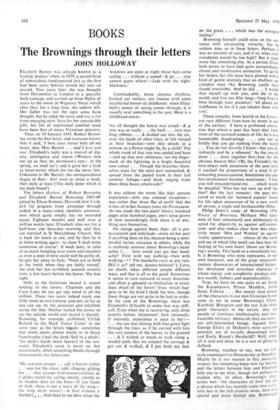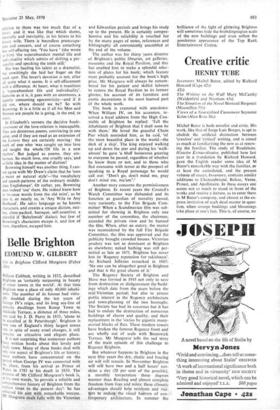BOOKS The Brownings through their letters
JOHN HOLLOWAY
Elizabeth Barrett was already known as a leading 'poetess' when, in 1839, a second bout of tuberculosis (undiagnosed just as the first had been years before) turned her into an invalid. Two years later she was brought from Devonshire to London in a specially built carriage, and carried up three flights of stairs to the room in Wigmore Street which after that, for a long time, she seldom left. Her father was not the ogre some have thought, but he ruled the roost and was a far from engaging man. Save for her remarkable gifts, her life of imprisoned comfort must have been that of many Victorian spinsters.
Then, on 10 January 1845, Robert Brown- ing wrote his first letter, and everyone knows that it said, 'I love your verses with all my heart, dear Miss Barrett . . . and 1 love you too'. Elizabeth's reply was a marvel of dig- nity, intelligence and charm Minters shut me up as they do dormouse's eyes: in the spring, we shall see'), and it gave her a lead as letter-writer which for me she never lost. Unknown to Mr Barrett, the correspondence began to flow: first once or twice a week, then daily at least (`The daily letter which is my daily bread').
The letters (Letters of Robert Browning and Elizabeth Barrett Browning 1845-46 edited by Elvan Kintner, Harvard/ouP 2 vols i14 5s) progress from animated through ardent to a many-sided, idealistic amorous- ness which quite simply has no recorded equal. Eighteen months and well over a million words later, Elizabeth slips out for a half-hour one Saturday morning, and they are married in St Marylebone Church. She is back for lunch at one, and by then he is at letter-writing again : to close 'I shall write tomorrow of course'. A week later, in spite of as much bungling over trains and steamers as even a poet in love could well be guilty of, he gets her away to Italy. 'None are so bold as the timid, when they are fairly roused', she ends her last scribbled, assured, ecstatic note, a few hours before she leaves. She was right.
1846, as the historians record it, meant nothing to the lovers: Chartism and the Corn Laws do not get one word in all the million. These two poets indeed made one little room an everywhere; and not, so far as one can see, by the perennial and infallible recipe for that. Neither lacked the power to see the outside world and record it sharply. Browning, for example, published `Childe Roland to the Dark Tower Came' in the same year as the letters bogan : sometimes that poem seems almost manic in its fierce hypertrophy ('pad the dank/Soil to a plash'; 'the dock's harsh swart leaves') of the sen- suous. Elizabeth's verse is never so, but occasionally, when something breaks through incarceration, her letters are:
'My aversion proper .. . call it horror rather . . . was for the silent, cold, clinging, gliding hat . . . that strange bird-mouse-creature, as it glides round the ceiling silently, silently as its shadow does on the floor—If you listen or look, there is not a wave of the wing— the wing never waves! —A bird without a feather!, " And:then to see /tow when the
windows are open at night those bats come sailing . . . without a sound—& go. . . you cannot guess where!—fade with the night- blackness.'
Unmistakably, those sinuous rhythms, hushed yet restless, are intense with some recollected horror of childhood: when Eliza- beth's power of seeing comes through, it is usually over something in the past. Here is a childhood storm: 'we all thought the house was struck—& a tree was so really . . . the bark . . . torn into long ribbons . . . & dashed out into the air, over the heads of other trees, or left twisted in their branches—torn into shreds in a minute, as a flower might be, by a child! The whole trunk of that tree was peeled and bare —and up that new whiteness, ran the finger- mark of the lightning in a bright beautiful rose-colour . . . Though the branches them- selves were for the most part untouched, & spread from the peeled trunk in their full summer foliage,—and birds singing from them three hours afterwards!'
It was seldom she wrote like that; present experience—with one colossal exception— was rather that `drear flat of earth' that she writes of in her Sonnets front the Portuguese. As one reads the two poets' letters, hundred pages after hundred pages, one's sense grows of how astonishingly little there is of any- thing save themselves.
No charge against them, that: all is pre- occupation and solicitude—more on her part if anything than on his, because being a semi- invalid invites reticence in others, while she is endlessly anxious about Browning's head- aches ('. . . how could you get that head- ache? First with not walking—then with walking—! ! The headache came at any rate. Did it go? tell me, dearest-beloved!'). Love, no doubt, takes different people different ways, and that is all to the good. Sometimes it seems to turn outward in every direction, and effect a splendid re-vitalisation in every least detail of the lovers' lives; which hap- pens to be the kind I think the best, though these things are not quite to be had to order. In the case of the Brownings, there was Elizabeth's ill-health to make that way diffi- cult. Even when she is recovering, only three months before 'elopement', how tenuously, if intensely, experience is open to her! — `. . . the sun was shining with that green light through the trees, as if he carried with him the very essence of the leaves, to the ground . . . & I wished so much to walk along a shaded path, that we stopped the carriage & got out & walked, & I put both my feet
on the grass, . . which was the strangest feeling!'
Browning himself could seize on the sea- suous with coruscating voracity; but he seldom does so in these letters. Perhaps it was an extreme of tact, and if so, what corn. mendation would be too high? But it reads more like something else. As a person, Eliza- beth seems to have had quite extraordinary charm and unobtrusive animation. To go by her letters, her life must have glowed with a kind of gentle intensity that an ebullient yet complex man like Browning could have found irresistible. And he did . . . 'I would shut myself up with you, and die to the world, and live out fifty long,—long lives in bliss through your presence': 'all places are indifferent to me if I can.inhabit them with you'.
Those remarks, from lateish in the Letters, are very different from how he wrote in one of the earliest: 'I have a profound convic- tion that where a poet has been shut from most of the outward aspects of life, he is at a lamentable disadvantage . . . you say so boldly that you get nothing from the world . You do not directly I know—but you do indirectly and by a rebound.' As the two of them . . drew together first/Just for the obvious human bliss' (Ty the Fireside'), the love-object took possession of the poet until it reached the proportions of a total if all- rewarding preoccupation. Sometimes the end- less involvement becomes wearisome: 'I fear you will misunderstand me . . . which would be dreadful.' Who has not torn up stuff like that? But the fact remains: the poet who cared so much for 'outward aspects' found his life taken possession of by a new world of person, a single and inexhaustible Other.
Philip Drew's study of Browning (The Poetry of Browning Methuen 90s) takes note of how consciously and deliberately he opted for objectivity as against self-expres- sion; and also makes clear how this. objec- tivity meant 'Men and Women' as against 'scenic appearances . . . silence of the earth and sea irt which [the poet] can best hear the beating of his own heart' (those are Brown- ing's words). This leads to a remarkable fact. It is Browning who most represents, in our own literature, one of the great nineteenth- century discoveries of international-fiction: the developed and articulate character in whom energy and complexity produce end- less wealth, fullness and unpredictability.
True, we have no one quite to set beside the Karamazovs, Prince Myshkin, Julien Sorel, Fabrice . . . But nearer than almost all the characters in our mid-Victorian fiction seem to me to come Browning's Cleon, Karshish, Blougram and the rest. Like those great characters in the novels, they are people of luminous intellectuality and inex- haustible intricacy. Above all, they are inner-. are self-determined beings. Against them. George Eliot's or Dickens's most sustained portraits are of socially determined man; and Emily Bronte's Heathcliff? Well, when all is said and done, he is a sort of glittering dullard.
Browning, needless to say, was no full- scale counterpart to Dostoievsky or Stendhal. Maybe he is our nearest in this particular respect; but something keeps him far behind. and the letters between him and Elizabeth help one to see what, though not perhaps to explain why. In effect, Browning's char- acters were 'the characters of love (to use a phrase which has recently come into critic- ism) less in the full creative sense, than in special and more limited one. Browning s relation to them was too much that of a lover; and it was like that which shows, naturally and inevitably, in his letters to his future wife-. There is boundless preoccupa- tion and concern, and of course something less self-effacing too. 'You have' (she wrote to him) 'the superabundant mental life and individuality which admits of shifting a per- sonality and speaking the truth stilL' She was lauding his talent as a dramatist, but unwittingly she laid her finger on the weak spot. The lover's devotion is not, after all, quite what it seems. It is self-effacement with a difference. At heart, what it manifests is 'superabundant life and individuality'. Genuine as it is, it goes with an enormous, a latently consuming egocentricity—and if it did not, where should we be? So with Browning. It is a little as if all his Men and Women are people he is going, in the end, to know.
In Elizabeth's sonnets the decisive boule- versement of the love-relation is inescapable. They are dexterous poems, convincing in one sense, and if they are read as an extension of the Letters they are certainly moving: the work of one who 'was caught up into love and taught the whole/Of life in a new rhythm'. But judged as poems, they em- barrass. So much love, one cruelly says,'and so little idea in the matter of diction!
Browning himself was another thing. I can- not agree with Mr Drew's claim that he 'uses a mean or natural style'—`the vocabulary and speech-patterns of the ordinary Middle- class Englishman'. Or rather, yes, Browning does indeed 'use' them. He indeed knew how to 're-issue words from the old mint', as he puts it, or nearly so, in 'Any Wife to Any Husband'. He takes language as he knows characters, and creates a unique diction, rest- less, close-packed, baroque, self-assertive; a splendid if `Babylonish' dialect; but few of Browning's characters escape it, and few of them, therefore, escaped him.



































 Previous page
Previous page